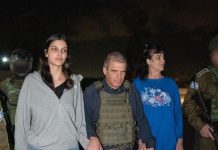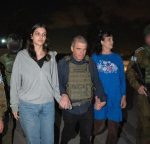MAY 27, 1967
This is an hour of crisis, not only for Israel as a State but for Israel as a people.[1] Our destiny, and the destiny of our children and children’s children after us, is being forged by the soldiers of Israel on lonely outposts in the Gaza strip and on the heights overlooking the Gulf of Aqaba.[2] No Jew can afford to look upon the tense situation as an outsider. As Mordechai the Jew said to Queen Esther, highly placed in non-Jewish society and politics, al tedami be’nafshech le’himalet beit avich, “Do not imagine that you will find safety whilst danger befalls the rest of the House of Israel.”
The Arab guns aimed at the heart of the State are aimed at our hearts. The stranglehold on the Gulf of Aqaba, the lifeline of the medinah, is a stranglehold on our throats. And the Russian contempt for the State of Israel bespeaks the old, traditional Russian contempt for all of us as Jews.
How ought we react in this grave hour? How have Jews always and should Jews now react?
The archetypical and symbolic confrontation between Israel and its enemies was that between Jacob and Esau. When Jacob, surrounded by his wives and children and his retinue, heard that the armed columns of Esau were marching towards him with vengeance in their hearts, the Rabbis tell us that he prepared a threefold strategy: le’tefillah, le’doron, u-le’milchamah: He prepared himself for prayer, for gifts, and for war. It is this threefold approach that must become the pattern for our attitude as well.
The doron, or gift, that Jacob presented to his brother was a form of legitimate appeasement of a bloodthirsty aggressor, in an attempt to turn his hatred into good will. Indeed, it happened to work with Jacob. But it cannot work for Israel today. First, you cannot placate an enemy who is implacable. Those of us who saw King Faisal on television two days ago heard him declare his avowed intention of exterminating Israel, and President Nasser said the same thing yesterday. Nothing less than that would satisfy our enemies. Moreover, Israel has nothing left to give. It has given all but the bare skeletal structure necessary for the survival of a modern country.
Hence, our doron must be the gift that we American Jews are going to give to the Jews and the government of the State of Israel; in other words, our accelerated participation in that great and historic venture known as the UJA. No Jew who fails to give, and to significantly increase his pledge over the past, has a moral right to be proud that he is a Jew. This year Israel faces unusual economic difficulty: The present fall-off in tourism, together with the stupendous military expenditures that it must undertake, make the situation and the need grave indeed. Those who will therefore give this year far in excess of what they gave in the past, and far in excess of what they are able to give, will be performing an invaluable service. Those who do not do so are, with all their talk, valueless for Israel. Their talk, their worry, their advice, their concern, their pride, their keeping their ears glued to the radio – all this is meaningless!
The Jewish Center Family will have an opportunity on June 7th[3] to demonstrate the extent of its commitment. I should like to see an enthusiastic response like never before. It behooves us to give our doron before we are solicited, and to prepare a gift that will tell Israel that we have not faltered, and all the world that Israel does not stand alone.
The second part of that strategy is milchamah, war. Can we participate in milchamah if it should be necessary?
Yes we can, and yes it is necessary. There are many ways to fight a war, many fronts, and many weapons. Our contribution, though not military, must not be under-estimated.
For one thing, we must undertake an indefatigable political campaign. As members of a subculture in this great democracy, it is entirely proper that we make our opinion felt where such opinions carry weight. We must undertake to inform our president, by letter and telegram, that we support his support of Israel, and to tell him as well as our senators and representatives that it was at the urging of an American secretary of state that Israel gave up much of its precious victory in Sinai, and that the United States has treaty obligations to Israel. This is one campaign in which we can participate immediately after the Sabbath is over.
Another way of making our political influence felt, in a more social manner, will come tomorrow morning when we shall participate physically in demonstrating our support for the State of Israel. We must all take our families and be present at the “Salute to Israel Parade.”
Even more directly, our young people can volunteer to help in Israel. Let them be encouraged. American law forbids military service on behalf of a foreign power. But there is much urgent work to be done, taking the places of Israel’s men and women who have been pressed into military service. People are urgently needed, and young people should by all means participate in the “Summer Work in Israel” program which has now been expanded, and in the “Sherut La’am” which offers one or two years of service in Israel. The medical services and all other specialties are urgently needed, but Israel even needs people just to dig trenches and build shelters.
So far, it is good to report that results have been most encouraging. Let no one henceforth speak flippantly of “the vanishing Jews of America”! The volunteer offers have been extremely heartening. I am told that only yesterday a surgeon called from San Francisco to New York to offer his services provided that his two sons would be taken with him. Of particular interest to this congregation is the fact that a brief notice pinned on the bulletin board at Yeshiva University produced, in 36 hours, more than 300 volunteers! I myself have been on the phone with a number of students, including a number of young ladies, from Yavneh, who have asked my intercession with their families to permit them to go forthwith to Israel.[4] There is something ineffably precious about the Jewish soul which allows it to express its idealism so immediately and so openly. Each in his own way, therefore, can participate in this great milchamah.
We are an irenic, peace-loving people. Our hopes and prayers are for peace not only for us but for the entire world. The author of Or ha-Chayyim has made this comment in a beautiful interpretation of a verse in today’s sidra. We read vi’yeshavtem la-vetach be’artzechem, “And ye shall dwell securely in your land,” followed by ve’natati shalom ba-aretz, “And I shall give peace to the land.” But, asks the Or ha-Chayyim, if we already are told that G-d will let us dwell securely in our land, surely that includes peace, and why then repeat the promise that G-d will give peace to the land? In his answer he distinguishes between artzechem and eretz: The first verse refers to security in artzechem, “your land,” which means the Land of Israel. The second verse, however, refers to the granting of peace in eretz, which should be translated not “the land,” but “the world”! In addition to our own national security, we are committed to the great hope and striving for peace throughout the world.
However, when duty and destiny call upon us to work so that others might bear arms on behalf of Israel, or even, if need be, that we do so ourselves, we shall not be found hesitating or faltering! If we were a nation like unto other nations, this fight would still be noble, but natural. Our existence is at stake, and we shall not submit to the murderous ambitions of that Hitler of the Nile, to those hysterical pygmies of Damascus, or to that venal and obnoxious monarch of the desert kingdom of slave traders.[5]
But Israel is more than that. The creation of the State of Israel was the minimum act by the powers of the world by which they salvaged the barest trace of human dignity left to them. Israel is a state conceived in the ghettos of Europe, born in the death camps of Auschwitz and Treblinka, delivered in the detention camps of Cyprus, and swaddled in the rags by which the Western powers blindfolded themselves to our agony and stuffed their ears not to hear our cry of anguish.
Israel is a penance paid by Russia for Babi Yar, by England for the Struma,[6] by the United States for its refusal to hear the cry of the refugees in time, by the Catholic countries for the silence of the Deputy Pope, by each and every country for its own public and private crimes against the people of the Lord.
When we shall, therefore, act in defense of Israel, we will be fighting not only for Israel’s and our existence, but in effect for the honor of Russia and England and America and France and all of mankind, whether they know it or not, realize or not, care or not, appreciate it or not, even whether they want it or not. For we shall ever remain, as Yehudah Halevi has called us, the heart of the nations and their conscience.
Tani be’shem Rav Elazar, ha-sayaf ve’ha-sefer nitnu mekorachin min ha-shamayim. The word and the Book were given wrapped together from Heaven. We have given the world its sefer, its Book. We shall, if need be, now defend the sefer, and the am ha-sefer (People of the Book) with a sayaf (sword) of courage and honor. For that charge and that mission is min-hashamayim, decreed from Heaven!
Finally, the third element in this Jewish strategy first taught by Jacob is tefillah, prayer. We can perform that by keeping the present situation in mind every time we speak, in our tefillot, of Jerusalem and Zion. In addition, we shall at the conclusion of services today recite special prayers for the welfare of the State of Israel.
But wedded to prayer is the concept of hope. Our prayer and our outlook must always be hopeful, never desperate.
I would like to commend to your attention an insight which speaks not only of hope but offers a perspective that goes far beyond the parochial limits of power politics. Our sidra, in enumerating the blessings G-d promises us, says: u-faniti alechem, “and I shall turn to you,” ve’hifreti etchem ve’hirbeti etchem…, “and I shall increase you, and make you fruitful, and keep My covenant with you.”
On the words u-faniti alechem, “I shall turn to you,” Rashi quotes the sages: Ipaneh mi-kol asakai le’shalem secharchem, “I shall turn away from all My other preoccupations in order to grant you your reward.”
What a strange remark! Are we really to take that so anthropomorphically, so primitively? Is G-d “busy” with other matters so that He has to take “time off” in order to pay loving attention to us?
An answer is provided to us by Rabbi Mordechai Rogov of Chicago, in his work “Ateret Mordechai.” He points to the midrash which states in the name of Rabbi Samuel bem Nachman that G-d says: Ki anochi yadati et ha-machshavot, for I know the thoughts of all men. Applying that to the story of Joseph and his brothers, the midrash tells us that the brothers were preoccupied with the selling of Joseph, Joseph was busy bemoaning his own bitter fate, Judah was involved in looking for a wife – but ve’ha-Kadosh baruch Hu hayah asuk be’oro shel Mashiach, all this while, G-d was preoccupied with the light of the Messiah! Each of the actors in the great drama thought that he knew the whole story. The brothers saw this as an act of vengeance; Joseph as a bitter tragedy that had reached its nadir; Judah was altogether distracted by an extraneous matter. None of them really saw the entire episode in its true, ultimate perspective. None of them realized that G-d was not “busy” moving affairs as He individually saw it, but that the Almighty was simply making preparations for the ultimate development of Jewish history, leading to the final redemption. The Joseph story, even more than others, reveals how human intention and Divine design can sometimes be utterly different and yet mesh with each other, and how the Divine plan often uses humans who do not even appreciate the role that they play.
Man, by virtue of his natural human limitations, can see only a segment of reality and experience. But if man is wise, he recognizes this, and he understands that beyond his own comprehension there is a G-d Whose own designs defy our pitiful human attempts at probing His mysteries. We are all actors who play significant roles in a great drama, but few of us ever have any inkling of the extent and direction of the plot.
So it is with the current episode. Today the Arabs are thinking of a quick victory. Russia sees the entire incident as a chance to dislodge the United States from Vietnam. Israel views it as one great crisis that must be overcome. The United States considers it as an added complication forcing it to juggle both Near-Eastern and Far-Eastern commitments. The United Nations regards it as a need to make up for U Thant’s blunder, the biggest in the history of diplomacy.[7]
But our hope and our confidence is that G-d will take “time out” from these individual considerations of the protagonists of the drama and ultimately reveal to us His true preoccupation: Ve’ha-Kadosh baruch Hu hayah asuk be’oro shel Mashiah, that Almighty G-d is weaving all these political and military strands into the garment of light that the Messiah will wear, into the intricate designs by which there will come to Israel and all the world the geulah shelemah, the complete redemption.
May, indeed, all our heartache and anxiety, all our worry and preparation for war, be transcended by the yeshuah, by the great victory and salvation which will come, speedily in our day. Ve’shalom al Yisrael – and may peace arrive for Israel and all mankind. n
[1] Ed. note: This sermon was delivered just days before the outbreak of the Six Day War.
[2] Ed. note: Egyptian President Nasser’s decisions to ask for the removal of the UN peacekeepers from Sinai and especially to block the Gulf of Aqaba to Israeli shipping via the Straits of Tiran are commonly accepted as the point where war became inevitable. https://en.wikipedia.org/wiki/Origins_of_the_Six-Day_War.
[3] Ed. note: Rabbi Lamm refers here to the Israel Day Parade, now called the Celebrate Israel Parade.
[4] Ed. note: Yavneh was an Orthodox college student group. Rabbi Lamm served as the organization’s chairman for a number of years.
[5] Ed. note: These are references to the leadership of Egypt (Nasser), Syria (the Ba’ath party), and Jordan (King Hussein) respectively.
[6] Ed. note: The Struma disaster was the sinking on 24 February 1942 of a ship, MV Struma, which had been trying to take nearly 800 Jewish refugees from the Axis member Romania to Mandatory Palestine. After the ship failed, British diplomats and Turkish officials negotiated over the fate of the passengers. Because of Arab and Jewish unrest in Palestine, the British government was determined to apply the terms of the White Paper of 1939 to minimize Jewish immigration to Palestine. British diplomats urged the Turkish government of Refik Saydam to prevent Struma from continuing her voyage. When the Turks denied its entry and the British forbade it from proceeding to Palestine, the unseaworthy vessel was forced to leave harbor. The Turkish authorities abandoned the ship in the Black Sea, about ten miles north of the Bosphorus, where she drifted helplessly. On the morning of 24 February there was a huge explosion, and the ship sank. Many years later it was revealed that the ship had been torpedoed by the USSR Shch-213. https://en.wikipedia.org/wiki/Struma_disaster
[7] Ed. note: Then-Secretary General of the United Nations U Thant was widely criticized for acceding to Egypt’s May 1967 demand that UN peacekeeping troops evacuate Egypt, opening the door to war. https://ciaotest.cc.columbia.edu/olj/meria/meria_jun05/meria05_cam01.pdf















